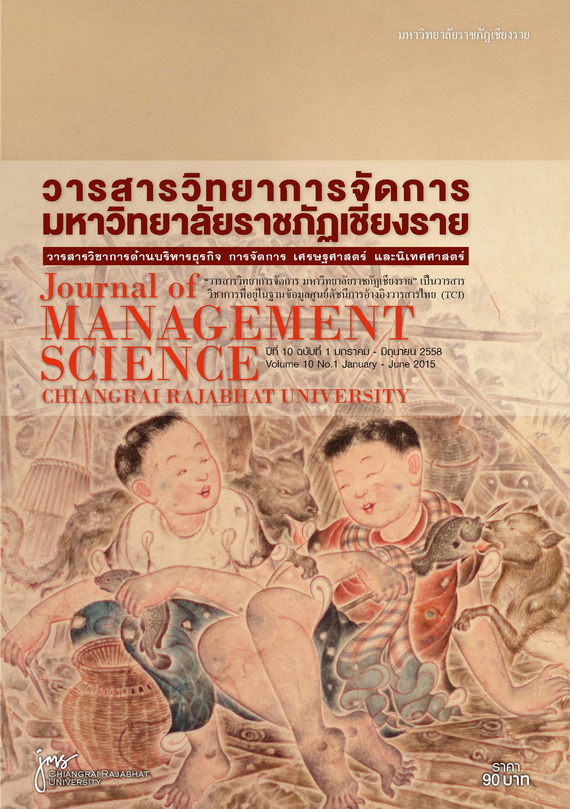The Study of Personal Characteristics, Transformation Leadership and Organization Culture Affecting the Effectiveness of Operating Officers: A Case Study of Sathon, Bangkok
Main Article Content
Abstract
The objectives of this study were to study the differences in demographic characteristics affect the effectiveness of operating officers from Sathon, Bangkok, to study the impact of the transformational leadership affects the effectiveness of operating officers from Sathon, Bangkok, and to study the impact of the organizational culture affect the effectiveness of operating officers from Sathon, Bangkok. A close-ended questionnaire was used to collect data and content validity and Cronbach’s Alpha reliability tests were used in this study. The result of the Cronbach’s Alpha reliability test was 0.963 from 30 participants' contributions. Moreover, 400 participants, all operating officers from Sathon, Bangkok, were asked to fill out the questionnaire set. Descriptive and inferential statistical methods were used, as described in T-test and F-test. It showed that the demography of sex, age, education level, monthly income, and working life was different effective on overall performance. On the other hand, in terms of marital status was not different effective on overall performance. Furthermore, using statistical correlation with Multiple Regression Analysis techniques. The result revealed that transformational leadership such as charismatic and individualized considerations affects the effectiveness of operating officers. On the other hand, in terms of inspirational not affects the effectiveness of operating officers from Sathon, Bangkok, and organizational culture such as personal initiative and the reward system of the organization affect the effectiveness of operating officer. On the other hand, in terms of the unity not affect the effectiveness of operating officers from Sathon, Bangkok.
Article Details
Views and opinions expressed in the journal do not necessarily reflect those of the editors.
References
วารสารสังคมศาสตร์ มหาวิทยาลัยเกษตรศาสตร์ .20(5), 32. ศรีสมพร รอดศิริ. (2551). ประสิทธิผลการปฏิบัติงานของบุคลากรในการนำระบบสารบรรณอิเล็กทรอนิกส์มาใช้ในกรมตรวจบัญชีสหกรณ์ กระทรวงเกษตรและสหกรณ์.วิทยานิพนธ์ปริญญามหาบัณฑิต, มหาวิทยาลัยราชภัฎพระนคร.
สาธิต บุบผาสี. (2553). ภาวะผู้นำกับประสิทธิผลขององค์การ ศึกษากรณี: กรมสรรพาวุธ ทหารอากาศ. สารนิพนธ์ปริญญามหาบัณฑิต, มหาวิทยาลัยเกริก. Bass, B. M. (1985). Bass & Stogdill’s handbook of leadership (3rd ed.). NY:Free. Bass, B. M., & Riggio, R. E. (2006). Transformational leadership (2nd ed.). Mahwah, NJ: Lawrence Erlbaum Associates. Bennis, W. G., & Nanus, B. (1985). Leader: The strategies for taking charge. NY: Harper & Row. Chaleff, I. (1995). The courageous follower: Standing up to and for our leaders.
SanFancisco: Berrett-Koehler. Denison, D. R. (1990). Corporate culture and organizational effectiveness. NY: Wiley. Gordon, J. R. (1999). Organization behavior: A diagnostic approach. Upper Saddle River, NJ:Prentice Hall. Podsakodd, P. M., Mackenzie, S. B., Moorman, R. H., & Fetter, R. (1990). Transformational leaderbehavior andtheir effectsonfollowers trustonleader, satisfaction, and organizational citizenship behaviors. Leadership Quarterly, 1(2), 107-142. Schein, E. H. (1997). Organizational culture and leadership. NY: Jossey-Bass. Smircich, L. (1985). Organizational culture. NewburyPark, CA:SAGE. Smircich, L., & Calas, M. B. (1987). Handbool of organizational communication: An interdiscip;inary perspective. NewburyPark, CA:SAGE. Yukl, G. (1998).Leadership in organizations (4th ed.). Englewood Cliffs, NJ:Prentice Hall.


